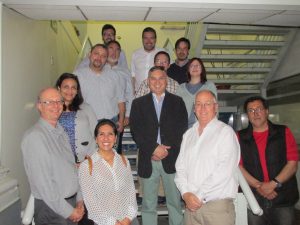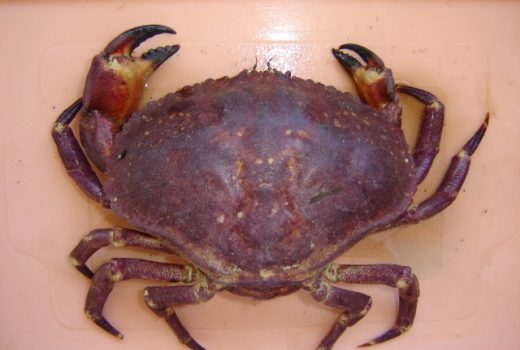IFOP organizes panel of experts on crab
November 2nd, 2016
Experts at the meeting
It is developed within the project “Upgrading of fishery biological parameters of south-central Chilean crab” and will feature leading national and foreign experts
On 26 and 27 October, at the “Marco Espejo Vidal” auditorium of IFOP Valparaiso, a meeting will be held with national and international experts linked to the knowledge of benthic crustaceans. The objective of this activity is to provide knowledge to the study of crabs being made by IFOP in conjunction with Instituto de Ciencias Marinas y Limnológicas de la Universidad Austral de Chile, within the project framework of “Updating of fishery biological parameters of crab in the central area of south Chile” which is funded by the Fondo de Investigación Pesquera y Acuicultura (FIPA), whose main objective is to determine, update and validate the parameters and fishery biology processes, relevant life cycle of the main species of crabs, as input for the implementation of stock assessment models, development of management plans and decision-making in the country’s southern downtown area. The Project Manager of this study is the marine biologist and Master in Management of Aquatic Resources, Andrés Olguín Ibacache. In turn, the team of Universidad Austral is led by marine biologist and Ph.D. Luis Pardo Suazo.
The study is carried out in V, VII, VIII XIV and X regions, in fishing areas associated with the coves of San Antonio (V Region), Curanipe (Region VII), Tome and Tumbes (VIII Region), Los Molinos (XIV Region) and Ancud (Region X). The study is estimating, by one side, parameters associated with the reproductive cycle of these species, such as the size and age of first sexual gonadal maturity, first copulation and possession of eggs, besides of the type of mating strategy. In addition the parameters and functions of growth (growth in length and weight) and life history parameters (mortality and critical size) are studied.
Andrés Olguín referred to the activity: “the importance of these instances is that it allows us to IFOP researchers, to exchange experience and knowledge with scientists from connoted experience in crustaceans, which will present their perspective on the results of reproductive nature and crab growth on this study. Also we aim to increase our knowledge on these subjects, from the information provided by the experts and dialogues developed within the panel of experts, since eventually all have the same objective: to allow the sustainability of the crab resource”.
To this panel of experts, the following people are from Chile:
- Msc. Marine Biologist Pedro Baez. Head of Hydrobiology Research Section of the National Museum of Natural History in Santiago de Chile from 1983 to 2000. He has developed museum activities, both curatorial and scientific research in his specialty (taxonomy, ecology and biogeography of crustaceans).
- Dr. Enrique Dupré, Academic of Universidad Católica del Norte, Specialist in reproductive biology of decapod crustaceans and their early stages of life. Professor of Embryology, School of Medicine, University of Valparaiso between 1978 and 1984. Professor of Development Biology at Faculty of Marine Sciences of Universidad Católica del Norte (UCN) since 1985. Professor of Embryology, School of Medicine UCN, since 2003.
- Dr. Billy Ernst, Marine Biologist of Universidad de Concepcion, Chile. Master of Science with a major in Oceanography, Universidad de Concepción. Doctor of Philosophy (Ph.D.) mention in Fisheries. School of Aquatic and Fishery Sciences, University of Washington, United States. Director of various projects related to decapod crustaceans. Currently, a researcher and academic at the University of Concepción.
- Dr. Carlos Montenegro, Engineer in Industrial Management, Master in Statistics and Ph.D. in Statistics from the University of São Paulo. His areas of interest are the statistical modeling, particularly fisheries applications of generalized linear mixed-effects models, state-space models and geo statistics. He has served as an evaluator of crustaceans demersal stocks in the last 10 years as head of the monitoring program of these fisheries in the past. He is currently head of the Division of Fisheries Research (S) of the Instituto de Fomento Pesquero (IFOP).
From abroad we are honored to have the presence of:
- Dr Thomas Miller, Director of the Chesapeake Biological Laboratory of Environmental Science Center and academic at the University of Maryland, USA. Specialist in population dynamics and bio-physical interactions, and various lines of research into the blue crab. He started at LBC in 1994, after four years of post-doctoral training at McGill University, where he worked on the reproductive ecology and dynamics of Atlantic cod. Since 1997, Dr. Miller and his research group have conducted considerable research on the dynamics of blue crab. From 2001-2005, leading efforts have been made to develop a sustainable approach to the management of blue crab in the Chesapeake Bay. Dr. Miller is a member of the scientific committee and management to the Mid-Atlantic Council of Fisheries Administration, the Marine Fisheries Commission of the Atlantic States and Fisheries Commission of the Potomac River.
- Ingo Wehrtmann, Dr. in Natural Sciences (Dr. rer. Nat.) at the University of Hamburg, Germany. He did his thesis: “Studies on the larval ecology of Crangon septemspinosa Say (Decapoda, Caridea) and transport modeling of their larvae.” Since 2001 he works as Associate Professor and researcher at the School of Biology at the University of Costa Rica (UCR), curator at the Museum of Zoology, research associate at the Center for Research in Marine and Limnology (CIMAR) UCR Science and Coordinator Director of the Fisheries and Aquaculture Research (UNIP) of CIMAR, UCR. His areas of interest are the aquatic biodiversity, ecology of marine invertebrates, reproduction of decapod crustaceans, aquaculture, environmental education and integrated management of coastal resources.
